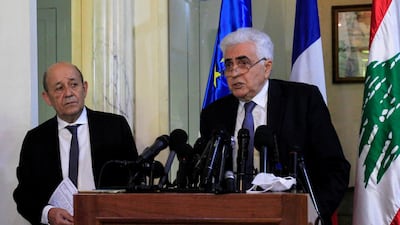Lebanon's Foreign Minister Nassif Hitti, a veteran diplomat and former Lebanese ambassador to the Arab League, resigned on Monday saying he could not continue given the poor performance of the government.
After meeting Prime Minister Hassan Diab on Monday morning at the Grand Serail he urged those in charge to change course.
“Lebanon today is not the Lebanon that we loved and wanted as a beacon and a model,” the resigned minister said. “Lebanon today is slipping into a failed state.”
He blamed an absence of vision as well as historical circumstances for the present crisis.
“In the absence of an effective will to achieve the required comprehensive structural reforms that our nation demands, I decided to resign from my duties as Minister of Foreign Affairs. I hope the government and those in charge of the state administrations reconsider many policies and practices in order to give priority to the people and the country over all other considerations and divisions.”
Lebanon in crisis
He said that instead of a clear will to fix the country's ills, he found a government and politicians with competing interests.
"What is required in the state-building process are creative minds, a clear vision, sincere intentions, a culture of institutions and the rule of law, accountability and transparency," he said.
"I participated in this government to work for one employer called Lebanon, but I found in my country (different) employers and contradictory interests. They did not agree on the interest to rescue the Lebanese people."
President Michel Aoun’s diplomatic adviser Charbel Wahbi was appointed as the new foreign minister later on Monday afternoon.
Before the announcement, a senior official confirmed that Mr Hitti would resign over the government's lack of achievements.
"He is mainly not happy with the performance of the government," the senior official told The National. But the source pushed back on media speculation that Mr Hitti was angered by Mr Diab's treatment of French Foreign Affairs Minister Jean-Yves Le Drian during a recent trip to Lebanon and that he felt overshadowed by the head of one of Lebanon's most powerful intelligence agencies, Maj Gen Abbas Ibrahim, who travelled to Kuwait and Qatar in July as President Michel Aoun's personal envoy.
The source dismissed the reasons being put forward by the press, saying these "are not serious”.
The government has made little progress in passing needed reforms or tackling pressing problems like the mounting piles of rubbish, lengthening daily power cuts and rising poverty.
Put together in late January to address Lebanon’s worst-ever economic crisis after months of social unrest, the government has failed to implement the required reforms to receive financial aid from the international community. Negotiations with the International Monetary Fund, which began in May, have stalled.
During a two-day visit to Lebanon in late July, Mr Le Drian stated that Lebanon would not receive any support from the international community, including France, if it did not “wrap up negotiations with the IMF”, reform the electricity sector and increase the independence of the judiciary. He urged the Lebanese “to help us help you.”
In what was widely criticised as a blunder by Lebanese politicians, Mr Diab said a few days later that Mr Le Drian “lacked information” about government reforms.












